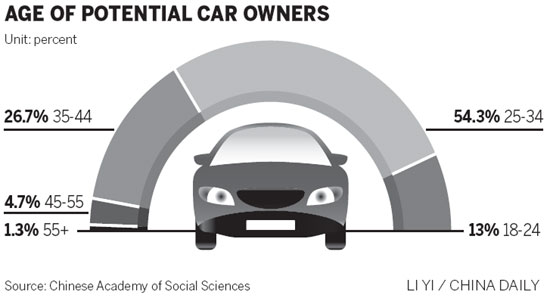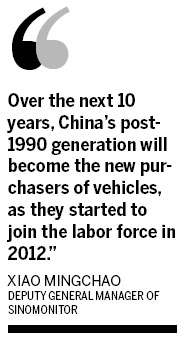Younger buyers hoping to get in the driver's seat
Updated: 2013-01-24 11:06
By Li Fangfang (China Daily)
|
||||||||
China's future drivers are getting younger and want more functional vehicles, according to the Chinese Academy of Social Sciences' 2012-2013 Annual Report on the Development of Auto Society in China.
The report was based on a survey conducted by the academy in cooperation with the research firm Sinomonitor in eight Chinese cities in 2012.
|
 |
The survey questioned 1,085 potential consumers who intended to buy a car within a year in first- and second-tier cities including Beijing, Shanghai and Zhengzhou.
Single people accounted for 41.1 percent of the respondents. Among them, 23.3 percent had been working for several years, and 11.4 percent had just graduated from university.
Moreover, their average age fell from 30 in 2011 to 29.8 in 2012. In lower-tier cities, the potential buyers were much younger.
|
 |
In third-tier cities, potential buyers aged under 30 accounted for 66.3 percent, compared with 56.2 percent in second-tier cities, and 54.2 percent in first-tier cities.
"Over the next 10 years, China's post-1990 generation will become the new purchasers of vehicles, as they started to join the labor force in 2012," said Xiao Mingchao, deputy general manager of Sinomonitor.
The survey found that women are becoming a force to be reckoned with among vehicle buyers. In first-tier cities, they accounted for 55.8 percent of potential buyers.
"As more women join the ranks of China's vehicle purchasers, their requirements and preferences will affect the development of new models and auto makers' strategies," said Xiao.
The survey also showed that the middle class will continue to dominate China's car market in the near future.
Xiao said managers, white-collar professionals, small-business owners and engineers will make up the lion's share of potential buyers.
The German premium vehicle brand Mercedes-Benz, which sponsored the report, has seen success in recent years, largely due to the "Young Mercedes" strategy it adopted in 2007.
The company's sales of "Young Mercedes" - smaller cars for younger people - are catching up with the traditional large models, and now account for 40 percent of its total sales.
Fellow German luxury car brands Audi and BMW have also made efforts in recent years to bring their entry-level models to the Chinese market, to win the increasing number of younger Chinese consumers.
lifangfang@chinadaily.com.cn
- Volvo sales drop defies surging luxury sector
- Subaru maker targets 6% sales increase for 2013
- GM hangs on to lead over VW in full-year sales
- China's auto output, sales set world record again
- Geely's Dec sales up 24% year-on-year
- Vehicle sales overtake Europe in 2012
- Japanese car sales go into reverse gear
- Mazda records a 12.9% decline

 Li Na on Time cover, makes influential 100 list
Li Na on Time cover, makes influential 100 list
 FBI releases photos of 2 Boston bombings suspects
FBI releases photos of 2 Boston bombings suspects
 World's wackiest hairstyles
World's wackiest hairstyles
 Sandstorms strike Northwest China
Sandstorms strike Northwest China
 Never-seen photos of Madonna on display
Never-seen photos of Madonna on display
 H7N9 outbreak linked to waterfowl migration
H7N9 outbreak linked to waterfowl migration
 Dozens feared dead in Texas plant blast
Dozens feared dead in Texas plant blast
 Venezuelan court rules out manual votes counting
Venezuelan court rules out manual votes counting
Most Viewed
Editor's Picks

|

|

|

|

|

|
Today's Top News
Boston bombing suspect reported cornered on boat
7.0-magnitude quake hits Sichuan
Cross-talk artist helps to spread the word
'Green' awareness levels drop in Beijing
Palace Museum spruces up
First couple on Time's list of most influential
H7N9 flu transmission studied
Trading channels 'need to broaden'
US Weekly

|

|







